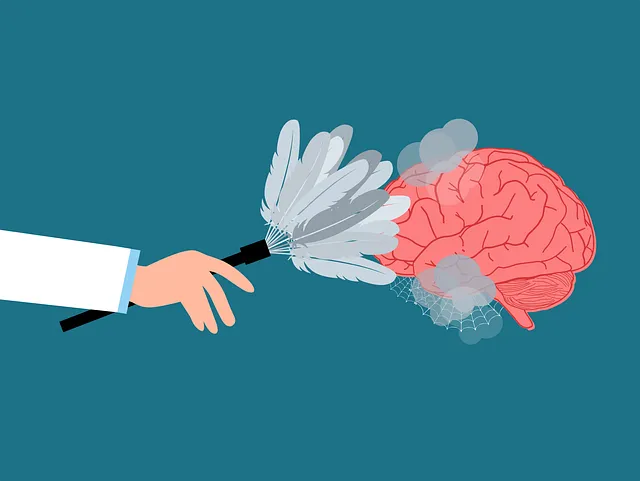Coping skills are vital for managing life's challenges and maintaining emotional balance, especially in high-stress professions like healthcare. Littleton Kaiser Permanente behavioral health services offers evidence-based programs focusing on stress management, mindfulness, self-care, and emotional intelligence to empower individuals, prevent burnout, and improve overall mental well-being. Their comprehensive approach includes strategies for setting work-life boundaries, regular exercise, adequate sleep, and accessible education through the Mental Wellness Podcast Series, fostering a resilient community capable of navigating life's curveballs.
Coping skills are essential tools for navigating life’s challenges and maintaining mental well-being. This article explores the profound impact of strong coping mechanisms, providing a comprehensive guide to their development. We delve into effective strategies, highlighting the support offered by Littleton Kaiser Permanente Behavioral Health Services, a leading provider in this domain. By understanding and cultivating these skills, individuals can enhance resilience, manage stress, and lead happier, more balanced lives.
- Understanding Coping Skills and Their Significance
- Strategies for Developing Effective Coping Skills
- The Role of Littleton Kaiser Permanente Behavioral Health Services in Coping Skills Development
Understanding Coping Skills and Their Significance

Coping skills are the strategies we use to navigate life’s challenges and maintain our well-being. They play a pivotal role in mental health management, especially for individuals seeking support through Littleton Kaiser Permanente behavioral health services. Understanding these skills is essential as they empower people to manage stress, anxiety, and difficult emotions effectively. By learning coping mechanisms, individuals can transform their reactions to stressful situations, fostering resilience and overall emotional balance.
Developing robust coping skills offers a range of benefits, including improved stress tolerance, better anxiety relief, and enhanced ability to cope with life’s curveballs. It involves adopting healthy habits such as engaging in regular exercise, practicing mindfulness, or implementing effective time management strategies. Moreover, cultivating positive thinking and self-care routines contribute to better mental health, allowing individuals to approach challenges with a more optimistic mindset.
Strategies for Developing Effective Coping Skills

Developing effective coping skills is a crucial aspect of maintaining mental well-being, particularly in high-stress professions like healthcare. At Littleton Kaiser Permanente behavioral health services, we emphasize strategies that empower individuals to navigate challenges and promote resilience. One key approach is integrating Burnout Prevention Strategies for Healthcare Providers into daily routines. This involves setting clear boundaries between work and personal life, practicing mindfulness techniques to manage stress, and engaging in regular physical activity to reduce tension.
Additionally, cultivating a robust Self-Care Routine Development for Better Mental Health is vital. This includes adequate sleep hygiene, nutritious meal plans, and dedicated time for hobbies or relaxation. Emotional Intelligence plays a significant role here—being attuned to one’s emotions and understanding their impact on coping mechanisms helps in developing healthier strategies. By combining these practices, individuals can enhance their ability to cope with stress, prevent burnout, and foster overall emotional well-being.
The Role of Littleton Kaiser Permanente Behavioral Health Services in Coping Skills Development

Littleton Kaiser Permanente Behavioral Health Services plays a pivotal role in empowering individuals to develop essential coping skills. Through their comprehensive programs and expert professionals, they offer a safe space for learning and growth. The services focus on various evidence-based therapies and techniques, including conflict resolution strategies, which are instrumental in helping people navigate challenging situations with resilience. By integrating these skills into daily life, individuals can enhance their mental health awareness and overall well-being.
In addition to individual therapy sessions, Kaiser Permanente produces a Mental Wellness Podcast Series that educates listeners on various topics related to mental health. This innovative approach reaches a wide audience, fostering mental wellness discussions and providing accessible resources for those seeking support. The podcast’s production quality ensures engaging content, making complex concepts relatable and actionable, thereby contributing to the community’s overall coping skills development.
Coping skills are essential tools for navigating life’s challenges and stress. By understanding their significance and employing effective strategies, individuals can enhance their overall well-being. The article has explored these concepts, highlighting the critical role that organizations like Littleton Kaiser Permanente Behavioral Health Services play in promoting healthy coping mechanisms. Through evidence-based practices and tailored support, these services empower individuals to manage stress, improve resilience, and lead more fulfilling lives.






